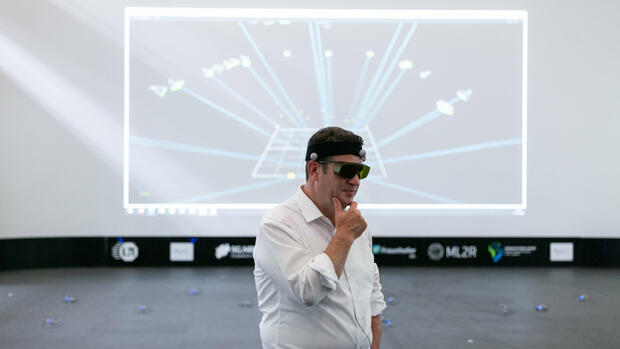Dortmund The drones buzz around the labor minister like a swarm of insects. Then Hubertus Heil (SPD) throws a Frisbee and immediately one of the small flying machines pounces on the flying plastic ball.
What they are researching here at the Dortmund Fraunhofer Institute for Material Flow and Logistics (IML) is called swarm intelligence. The drones fly autonomously and coordinate with each other as to which of them will grab the “prey”. This is made possible by artificial intelligence (AI), which is not only trained with data that is fed in, but also uses information about the environment.
What initially looks like a gimmick also finds its way into practical applications. The drones are just the testing ground for autonomous transport robots that may replace staff in logistics centers in the future. In a fenced area, Heil can be shown how the “load runners” can whiz around at ten meters per second, picking up goods and unloading them again.
“We’re at a point where we’re starting to share responsibility with AI – with machines,” says institute director Michael ten Hompel, who received Heil during his summer trip this year. “And that’s a real turning point.”
One that affects the entire working world and thus also the responsible minister. By 2035 there will be no more jobs that are not affected by AI, predict the digital experts from Heils Department. Every fourth employee already uses artificial intelligence in industrial production, in controlling or in customer management – often without even knowing it.
“We’re at a point where we’re starting to share responsibility with AI – with machines. And that is a real turning point.”
(Photo: J. Konrad Schmidt)
Heil is reluctant to stand on the sidelines. He pushed for his house to be involved early on, when the grand coalition under Angela Merkel was embarking on its first AI strategy. The work published in 2018 received a first update in 2020.
AI in companies: Worried about losing touch
But the technology is developing rapidly – and when visiting the institute in Dortmund, there is also concern that Germany could fall behind, despite all the initiatives and funding programs.
“We are too often in the spectator role and not actively involved,” says IML director ten Hompel. Although he deals with AI professionally every day, even he was “blown away” by how quickly language models like ChatGPT have developed.
No company is big enough and has enough money to be able to keep up with developments on its own, says the professor and holder of the chair for materials handling and warehousing at the TU Dortmund. Cooperation, also with science, is essential.
Read more about Department of Labor issues
But if even DAX companies are threatened with being overwhelmed, what about small and medium-sized companies or craft businesses? According to the Ministry of Labor, only ten percent of them use AI in their everyday work.
Starting in the fall, the rest will be given an understanding of the advantages of the new “colleague AI”, which can make work better, safer and more attractive. Heil’s department is setting up stationary AI studios in Munich and Stuttgart, where it is clearly demonstrated how artificial intelligence can be used in accounting or personnel planning, for example.
In the rest of the republic, AI info mobiles control the companies at their locations. The ministry is funding the project from the Fraunhofer Institute for Industrial Engineering (IAO) and the University of Stuttgart with around 4.1 million euros.
The AI, according to Heil’s credo, must be seen as an opportunity to maintain the global competitiveness of Germany’s industrial nation – even if the minister is poaching in the territory of his Green cabinet colleague, Economics Minister Robert Habeck.
Heil is planning an amendment to the postal law that will limit the weight of a package to 20 kilograms for one person.
(Photo: J. Konrad Schmidt)
But as Labor Minister, Heil is also responsible for occupational safety. And of course he knows that AI can also be used to monitor employees or ultimately make them superfluous.
Many jobs could be completely taken over by computers
The Institute for Labor Market and Occupational Research (IAB) already estimated for 2019 that a good one in three jobs subject to social security contributions in Germany can, at least theoretically, be done fully automatically by computers or computer-aided machines. Three years earlier, this only applied to every fourth job. And since 2019, the technology has again developed rapidly.
Heil therefore presented “proposals for modern employee data protection” in April together with Interior Minister Nancy Faeser (SPD). In autumn, the key issues paper is then to become a draft for an independent law.
Read more about artificial intelligence
“Artificial intelligence is almost dependent on large amounts of data,” says the seven-page key points paper. Because this could lead to “uncertainty and reluctance” among employees, clear regulations are needed to protect them. It is about striking a balance between the interests of companies and employees.
As part of the AI regulation planned at European level, the ministries want to provide regulations for typical processing operations of employment data that are based on AI or algorithms.
In Dortmund, however, Heil then also promotes a second law, in which his officials are involved. At the Fraunhofer Institute, he is allowed to try out what is known as an exoskeleton, which supports the muscles and can, for example, relieve parcel carriers when lifting and carrying.
Unfortunately, however, it will still be some time before every messenger receives such help, says the Labor Minister. In the amendment to the postal law that cabinet colleague Habeck is planning, he therefore wants to negotiate that parcels weighing more than 20 kilos must in future be delivered by freight forwarders and two deliverers. Some jobs remain – despite AI – backbreaking work.
More: The dawn of a new era – the big Handelsblatt AI special as a download
